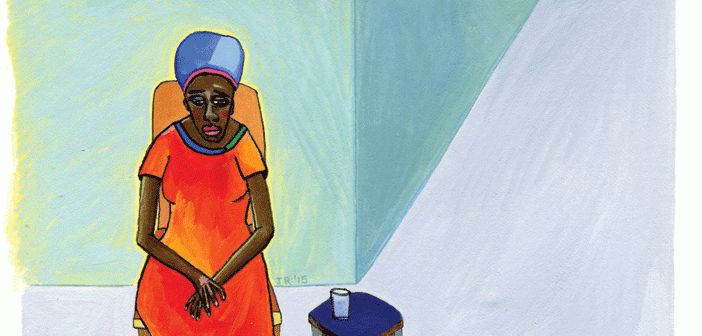When the medical mission ends, what happens to patients left behind?
I met Claudine when I traveled to Rwanda with a team of urogynecologists on a surgical mission trip to repair obstetric fistula, an unfortunate condition in which a woman develops a hole between her bladder and vagina or rectum and vagina during an obstructed labor process. Claudine appeared like many of the other patients, with her slight frame wrapped in a skirt of colorful kitenge fabric, but what set her apart was how adamantly she stared at her hands in her lap and how rigidly her sorrow was etched in her face. As the Rwandan medical student translated her story for me, Claudine silently nodded in confirmation, and looked away.
Claudine has been leaking urine and feces for 30 years. To suffer that long seems almost incomprehensible. When Claudine had her first, and only, child she labored for four days before being transferred to a district hospital. There she learned that her baby was dead. Two days later she discovered that she no longer had control over her bodily functions.
Afraid of being a wife who could not satisfy her husband and ashamed of the smell that constantly followed her, Claudine moved back to her family’s home. While at first her husband resisted her decision to separate, he soon chose another wife, confirming Claudine’s fear that she was inadequate. Two years after she started to leak, Claudine heard about mzungu (white) doctors coming to Rwanda and hoped they might be able to help her. It was 1984. The doctors saw the tragedy in her scar tissue, and knew there was no simple way to restore her former life. They opted to perform a urinary diversion to her sigmoid colon. It is unclear whether they checked the integrity of her anal sphincter before operating, but Claudine had none. After surgery she found she was still leaking both urine and feces, but now they leaked together from her anus. Alone and ashamed, Claudine has dredged through the last 30 years of her life making diapers of plastic bags and cloth.
Claudine’s symptoms did not improve, and her risk of developing colorectal cancer is now 100 to 550 times greater after having had a ureterosigmoidostomy. Her surgery failed and she needed cancer screening, but unfortunately the mzungus were gone.
With the fervor that only a medical student can have, I arrived in Rwanda ready to save lives, to collect the tragic stories of patients, and to feel that this pilgrimage would change my life permanently. And I did change in an irreversible way, but not because I satisfied my desire to see all of the patients healed in entirety. Claudine’s story taught me that we could not heal everyone.
The first time I heard the word “inoperable,” it seemed repugnant. It echoed of an ancient caste system, of people left behind. That categorization was given to those for whom surgery had a high risk of making the incontinence worse, or no different. These women were given waterproof underwear and an apology, and they returned home. I struggled to understand the reasoning behind our triage. Hadn’t we come to help? I wanted the surgeons to perform urinary diversions and colostomies in every Rwandan woman with urethras too short or rectal tissue too scarred for a successful fistula repair, so that they could live nearly normal lives. But Claudine’s story was a sad lesson that the benefits of a surgery must always outweigh the long-term risks.




